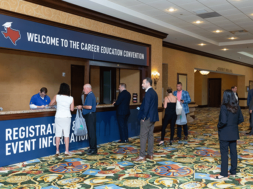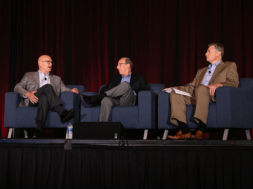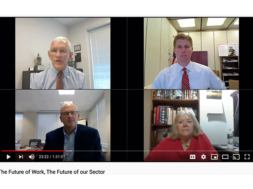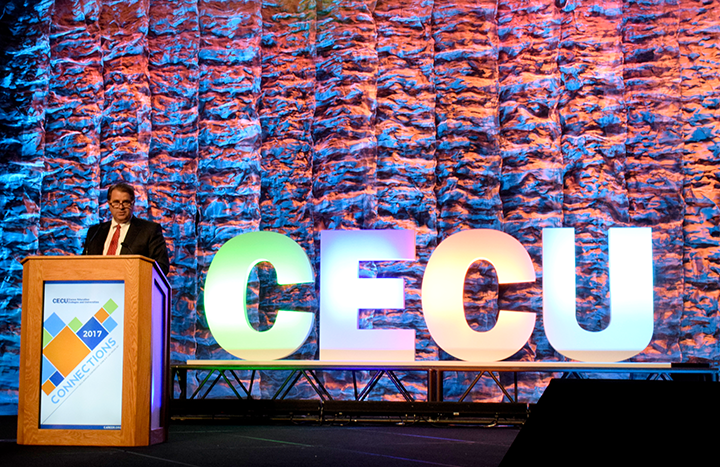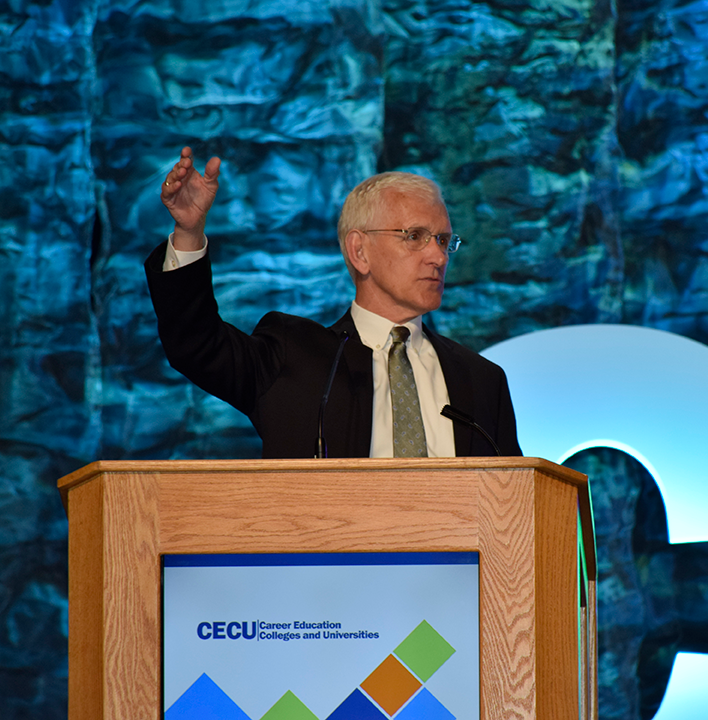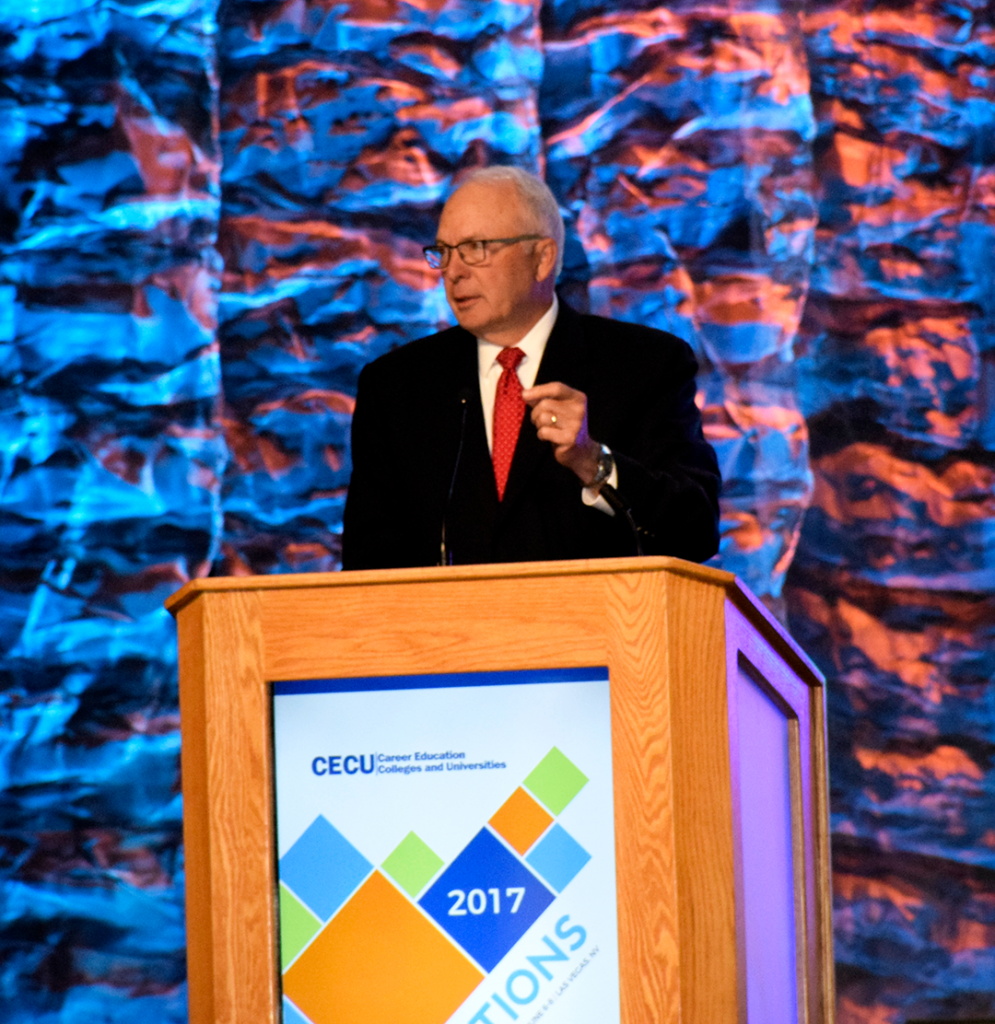
CECU Convention Speakers: Be an Advocate for the Sector
The overall mood at the 2017 Career Education Colleges and Universities Annual Convention & Expo was much lighter than just a year ago, with people more optimistic about the future of career education.
Held June 6-8 in Las Vegas, Nevada, the convention featured a variety of speakers who stressed the need for career colleges to be an advocate for the sector, as well as encouraged school officials to be proactive in the Higher Education Act reauthorization process.
The 2017 convention, organized around the theme of “connections,” was meant to allow people to connect and learn from each other, as well as leading experts.
Opening plenary session – Gerard Robinson
In the opening presentation, Gerard Robinson, a resident fellow at the American Enterprise Institute, said career colleges must become an advocate for the sector. Schools must start by changing the narrative, he said, and encouraging their students to use their voices.
Robinson said he learned a lesson from former Sen. Tom Harkin, D-Iowa, that politicians don’t want to hear from the “hired hands.” Instead, they want to hear from students. “When your consumer (the students) has a voice, it will change the narrative,” stated Robinson.
Students upset when their schools closed showed the power of speaking out and were able to change the narrative by alleging through social media that they were defrauded, he said.
“Talk to all the students who went on television and created YouTube videos when their colleges closed,” Robinson said. “I don’t want to get into the good or bad there. But the point is those students made a claim … and used social media to make it happen. All of a sudden, people were able to link the closure of a school to being for-profit, and therefore it was bad.”
Robinson said the sector needs to change the career college narrative. Schools can do that by getting students to tell their stories about how career colleges make a positive difference in their lives. “Find a unique way of getting your students to tell their story,” said Robinson.
Gerard Robinson at a glance
Before joining American Enterprise Institute as a resident fellow working on education policy issues, Robinson served as commissioner of education for the State of Florida and secretary of education for the Commonwealth of Virginia. As president of the Black Alliance for Educational Options, Robinson worked to ensure that children in low-income and working-class black families in several states and the District of Columbia were given the opportunity to attend good schools. Throughout his career he has evaluated the effects of reform initiatives on parental choice and student achievement, advocated for laws to improve delivery of teaching and learning, and published essays on how to make good policy to give all children a chance at a good job and future.
From 2013-14, Robinson served as vice president of partnerships for UniveristyNow Inc., a social venture based in San Francisco that works to expand access to quality higher education options for campus and online programs at Patten University, where he has served as a trustee since 2013.
Robinson has a master of education degree from Harvard University, a bachelor degree in philosophy from Howard University, and an associate of arts degree from El Camino College.
“The demographic of your student body looks radically different than people think,” he said. Most often people think 19-year-old white males attend career colleges. “But you’ve got women. You’ve got military. You have mature people. You have African-American, Native American, Asian and otherwise. That is the type of demographic story that we need to see.”
Robinson also said that now is the best time to reauthorize the Higher Education Act for several reasons.
“Number one, this is the best time in the history of American higher education to be a student,” he said. “You want to know why? Because you can learn and burn in 2017 in ways you could not in 1967 or 1907.”
In addition, you have the millennial generation who are interested in learning in new ways. “They now learn on an iPhone or Android,” he said. “They learn if they’re across the street or if they’re overseas. They want to learn 24 hours a day. They learn at midnight, at 3 o’clock or at 7 o’clock. They want something dramatically different. You fill the niche because you often meet their needs. You have working students. You have nontraditional students.”
Career colleges have historically existed to help families and make a difference. “We now have people (in Washington D.C.) who ideologically believe this matters,” Robinson said, adding that President Donald Trump and Secretary of Education Betsy DeVos are committed to job and wealth creation. Trump and DeVos also believe in the importance of higher education and particularly vocational education, and understand that career colleges fill the niche for a lot of job opportunities.
Robinson met Devos nearly 10 years ago and said she got involved in the education movement, in part, to create a pathway for more Americans to have prosperity. While DeVos hasn’t said much about her agenda yet, he said it is being worked on, but acknowledged a timeline hasn’t been announced.
Robinson also worked for the new administration during the transition period. “I was the lead for education policy implementation for the Trump team and my job was to put together a day 1, day 100 and day 200 plan so that when they arrived in office, they could move forward.”
While some question the Trump administration’s higher education agenda, Robinson guaranteed that the documents put together and given to then President elect Trump and Vice President elect Pence, had information in there about higher education. “It had information in there about your sector because your sector matters to what we want to do 5, 10, 15, 20 years down the line,” said Robinson.
“This is not the time to shy away from being bold and saying here’s what we want,” said Robinson. “This is definitely the right time to push for the kind of changes that you want. If you don’t push for it, it won’t happen.”
He acknowledged that some schools are possibly weeks away from closing because of the absence of decisions by the Department of Education. “Some of you are trying to figure out when July 1 comes, and things become active, what’s going to happen to our sector?” said Robinson. “I’m glad that you have CECU because they do this work for you, not only at the state level, but also at the national level.”
In fact, the CECU has been busy doing just that in the last year.
CECU annual meeting of the members
At the annual meeting, David Vice, president and CEO of Asher College and chairman of the CECU Board of Directors, said CECU spent considerable time last fall strategizing how to engage the new Hillary Clinton administration. But Trump won and a lot of planning went out the window, he said.
CECU President Steve Gunderson agreed. “A year ago, (we were) anticipating a Clinton administration that might continue the eight-year attack on our sector, and we said we have to make (it) very clear the importance of who we are and what we do,” he said. “Perhaps the best way we can do that is to create a campaign to create 5 million career professionals in the decade ahead.”
An independent research company helped to create the 10-year CECU plan to create those career professionals out of a projected demand for 46.5 million new workers. “We’re not going to take over the world. We’re just going to do our part,” said Gunderson.
But perhaps even more important is the work CECU members have done on the Higher Education Reauthorization Act.
“The crowning jewel of our efforts in the last 12 months, and our largest project, included the collaboration of six working groups involving 70 different members,” Vice said. “The task was to draft policy recommendations for the Higher Education Authorization Act.”
Gunderson continued: “Since the election with over 70 different task members we worked to put together the most significant higher education proposal this sector has ever advanced, and I can tell you any sector of higher education has ever advanced, that will connect the higher education act to jobs.
Gunderson said he hopes the proposal, called the Higher Education Jobs Act, will be introduced in the near future. But now schools need to work on getting the message out about all the good they do, particularly to their elected representatives and their staff, he said.
One of CECU’s top priorities over the next fiscal year will be to work with school administrators to set up meetings with politicians, and make sure elected representatives are familiar and knowledgeable with the schools in their district, Gunderson said. “When we do that, we will then have the kind of outcomes we want in our students. We will have the kind of outcomes we want in our sector. Most importantly of all, we’ll have the kind of outcomes we want for our nation. That’s our opportunity and that’s our obligation.”
Lynelle Lynch, treasurer of the CECU Board of Directors, said the three-year strategic plan approved in 2016 included a financial commitment to use association reserves and ensure that the organization helped its member schools succeed.
Next year CECU will again spend over a million dollars of its reserves to focus in on its strategy to support the schools, she said. “Our board understands the economic challenges you are facing,” she said. “We are not going to be increasing dues.”
New board members were also introduced at the annual meeting: Duncan Anderson with Education Affiliates, Richard Luebke, Jr. with Pima Medical Institute, Janis Paulson from Unitek College, and Dan Peterson with Spartan Education Group. In addition, Art Keiser and Mel Weiner were reelected to the CECU board.
Closing keynote session – John Kline
Closing speaker John Kline, former chairman of the House Education and Workforce Committee, said the 115th Congress must reauthorize the Higher Education Act, something that has proven difficult to do in past years.
“We have got to simplify, simplify, simplify in everything we do,” Kline said. “Currently there are six types of federal loans and nine different repayment options, including five that are income driven. There is nothing simple about that.”
John Kline at a glance
Former chairman of the House Education and Workforce Committee, John Kline served in Congress for more than a decade as the representative from Minnesota. In addition, he served in the United States Marine Corps for 25 years, retiring at the rank of colonel.
Throughout his time in Congress, Kline was known for working hard for troops, veterans and students and their families, as well as expanding access to higher education. One of his first pieces of legislation signed by the president came shortly after Sept. 11, when Kline helped author the HEROES Act of 2003, Higher Education Relief Opportunity for Students, intended to ensure that service members who are receiving federal student aid are not adversely affected because of their military status and to minimize the administrative burden placed on such individuals.
Kline earned his bachelor’s degree from Rice University and his master’s degree from Shippensburg University.
Kline said the government is on an unsustainable fiscal path, lending more than $100 billion a year, including over $29 billion in Pell grants. “That’s many times over what it was 10 years ago,” he said. “We have to keep that in mind as we look for ways to make this simplified and more responsible.”
Kline advocated wiping the slate clean when revising the Higher Education Act. “We obviously want a very limited federal role,” he said. “I’m sure you’d want some dollars to go to poorer students. There’d be one set of rules for all institutions. There would be a much-needed and revised system of accrediting. Credit hours would not be the metric of quality education. Student aid would be fundamentally changed. Perhaps one repayment model would be income based.”
But it is highly unlikely the sector will be able to start with a clean slate, even though they have a new administration. “The relentless ideological assault on our sector and on everybody in this room has stopped,” he said. “That’s very good news, but in the Department of Education, (the) pace of staffing is horrific.” In the second week of June “we have nowhere near (the) people in place that we need.”
While the boat may now be going in the right direction, it won’t be smooth sailing yet, he said. “We were supposed to be doing a Higher Education Act Reauthorization at the last three Congresses. The really good news is we have some really good friends in Congress,” he said, adding that the chairs of the two committees, Senate and House, Lamar Alexander, R-Tenn., and Virginia Foxx, R-N.C., are allies and they “want to repair as much of the damage from the previous administration as can be repaired. Their staff is smart, experienced and ready to go to work.”
But there appears to be an impasse in Congress. “Getting things done is proving to be (a) hard thing to do,” Kline said, noting that getting rid of No Child Left Behind and replacing it with good legislation was also difficult to do.
“We finally reached the point where from coast to coast, from Honolulu to Bangor or Juneau to Tampa … there was a cry that said you’ve got to get rid of this thing. We don’t like Common Core. We don’t like this testing. It was everyone – Republicans, Democrats, students, parents and teachers. That allowed the pressure to build to the point where Republicans and Democrats in the House and the Senate could actually come together.”
It was still a pretty tough fight, Kline said. “We passed a really good bill in the House, passed a bill in the Senate and (then) went to a conference committee and sat down and we were able to hammer it out,” he said. “And No Child Left Behind went away.”
Now there is a need to try to apply the same scenario to the Higher Education Act, he said.
“Republicans and Democrats know we need to reauthorize the Higher Education Act, but it’s going to be darn hard to do. You’re not going to wave a wand and get the HEA reauthorized the next week or next month. It’s not going to happen in a hurry, but the pressure will build.”
So what can the sector do? “A lot of what you’re doing right here,” Kline said. “Putting good minds together, putting proposed legislation together, putting proposed regulatory changes together, and trying the best you can to communicate those with the Department,” he said. “As they start to get some more staff and are able to return the phone calls that will be helpful.”
Kline said the key is ensuring that students remain the top priority. “We need to think how we can put these students first,” he said. That means how can the sector make it easier for students to get in here, complete their studies faster and make sure they’ve got a certificate or a degree that they need to get the job that they want. “There are still some impediments out there and there’s still some regulations. But there’s stuff that you can do and you’ve been doing all along. I just encourage you to just step it up and do it as hard and fast as you can,” said Kline

